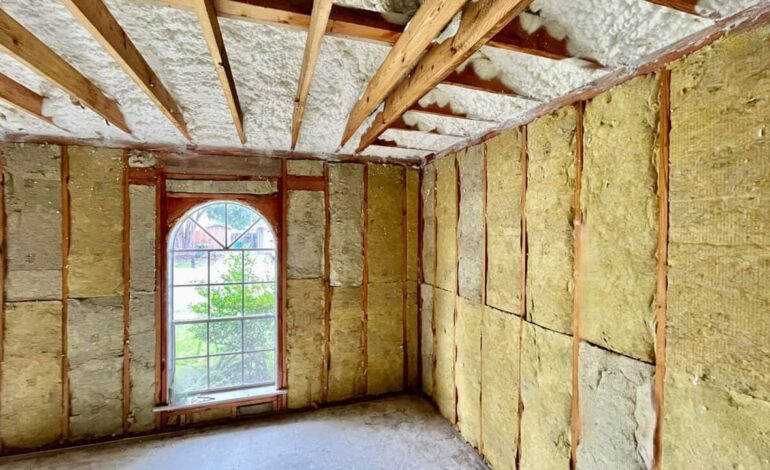
What Is Rockwool Insulation and Why Is It Popular?
When it comes to home insulation, the choices can feel overwhelming. You’ve probably heard of fibreglass, foam boards, or even spray foam, but have you come across Rockwool insulation?
What Is Rockwool Insulation?
Rockwool insulation, also known as stone wool, is made from volcanic rock and recycled slag. Yes, it’s derived from natural stone—specifically basalt—and then spun into a fibrous texture that resembles cotton candy. This process creates a durable, fire-resistant, and thermally efficient material.
But what sets Rockwool apart from the more traditional options? It’s not just about keeping your home warm in the winter and cool in the summer. Rockwool offers a host of benefits that go beyond basic temperature regulation.
1. Exceptional Thermal and Acoustic Insulation
Think about the comfort of your home. Do you want it to feel like a peaceful retreat, free from drafts and outside noise? This is where Rockwool insulation shines. Its dense fibres trap heat and sound, creating a dual-layer of protection.
By using Rockwool, you can:
- Lower energy bills – Rockwool helps keep the heat inside during winter and outside during summer, so your HVAC system doesn’t have to work as hard.
- Enjoy a quieter space – Thanks to its sound-absorbing properties, Rockwool reduces noise transfer between rooms and blocks outside sounds like traffic.
If you’re ready to make your space more energy-efficient and peaceful, check out where you can shop Rockwool insulation for your next project. Whether for walls, ceilings, or floors, it’s a great all-rounder for improving comfort.
2. Fire Resistance That Gives Peace of Mind
When choosing insulation, safety matters. Rockwool is non-combustible, meaning it won’t catch fire or contribute to spreading flames. In fact, it can withstand temperatures over 1,000°C.
Unlike some materials that can release toxic fumes when exposed to high heat, Rockwool remains stable. It doesn’t melt, drip, or emit harmful smoke. If you’re looking for peace of mind in the event of an emergency, this is a major selling point.
3. Moisture and Mould Resistance
Have you ever dealt with damp walls or mouldy insulation? It’s not only frustrating but also potentially harmful to your health. Rockwool insulation naturally repels water, thanks to its hydrophobic properties. Essentially, water droplets roll right off, rather than soaking in.
This means:
- No risk of soggy insulation losing its effectiveness.
- Mould and mildew don’t get the chance to grow, keeping your indoor air quality healthier.
This feature makes Rockwool especially appealing for areas prone to humidity, like basements or bathrooms.
4. Durability That Stands the Test of Time
Insulation isn’t something you want to replace frequently, so durability is key. Rockwool is built to last. Its composition means it doesn’t sag, shrink, or lose its insulating power over time. Plus, because it’s resistant to pests, you won’t have to worry about critters nesting in your walls and compromising its integrity.
5. Environmentally Friendly Choice
For those prioritising sustainability, Rockwool ticks the right boxes. It’s made from natural and recycled materials, which means a smaller environmental footprint compared to many other types of insulation. Additionally, because it’s so effective at improving energy efficiency, it helps reduce greenhouse gas emissions by cutting down on your energy usage.
If you’re eco-conscious, you’ll also appreciate that Rockwool can be recycled at the end of its life. It’s a win-win for your home and the planet.
Where Can You Use Rockwool?
Rockwool insulation is incredibly versatile. It’s commonly used in:
- Walls – Both interior and exterior.
- Floors – Especially between levels of a home to reduce noise transfer.
- Ceilings – For added thermal and acoustic benefits.
- Roofs – Flat or pitched, it provides excellent insulation.
- Industrial applications – Such as pipes and HVAC systems, thanks to its fire-resistant properties.
Whether you’re building from scratch or upgrading an existing structure, Rockwool has a solution for most insulation needs.
Is Rockwool Worth the Investment?
The short answer is yes. While Rockwool may have a higher upfront cost than some alternatives, its long-term benefits often outweigh the initial price. Plus, with its durability, you’re unlikely to need replacement any time soon, saving you money in the long run.
How Does Rockwool Compare to Other Insulation Materials?
You might be wondering how Rockwool stacks up against common alternatives like fibreglass or foam. While each material has its strengths, Rockwool offers several standout features that set it apart.
- Fibreglass vs. Rockwool – Fibreglass is widely used and affordable, but it’s less dense than Rockwool. This means Rockwool offers better soundproofing and fire resistance. Additionally, fibreglass can irritate the skin during installation, whereas Rockwool’s smoother texture makes it more user-friendly.
- Foam Boards vs. Rockwool – Foam boards are lightweight and provide good thermal performance, but they can struggle with moisture over time. Rockwool’s water-repelling properties make it a more durable choice in damp environments.
- Spray Foam vs. Rockwool – Spray foam is effective for sealing gaps and insulating irregular spaces, but it comes with a higher price tag and can’t match Rockwool’s fire resistance or recyclability.
Each material has its place, but if you’re after a balance of performance, safety, and sustainability, Rockwool often comes out on top.
Ready to Insulate Smarter?
Rockwool insulation has become a popular choice for good reason. It offers incredible thermal performance, soundproofing, fire resistance, and durability—all while being kind to the environment. Whether you’re focused on saving energy, improving safety, or simply enjoying a quieter home, this material delivers on all fronts.


